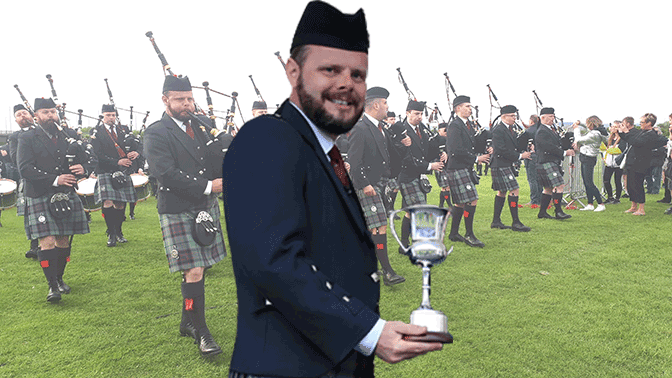

I arrived at Paisley around lunchtime on Saturday and after a coffee, picked up a programme (free) and headed over to the Grade 1 arena for the 2pm start of the British Pipe Band Championship .
Readers will know all the usual caveats about the audience not being as close as the judges are to the bands, extraneous chatter etc, etc and this should be borne in mind when they read this critique. But also bear in mind that the crowd does get pretty near to the circle at the St James Playing Fields. Adjudicator Robert Mathieson could have reached over and shared lumps of his birthday cake with us had he wished to such was his proximity to we mere scribblers. Yes, you have a very good handle on what is going on at Paisley. That said, I remind everyone; it is the judges’ opinions that matter, not mine.
[wds id=”2″]
There were three of them out for the first time at a Grade 1 major. These were Messrs Peter Hunt, Lee Innes and Robert Shaw. Was this the wisest decision by the adjudicator selection panel? Would it not be more prudent to blood their tyros one at a time giving the bench a better blend of ‘youth’ and experience, with weighting on the latter?
By and large the judges stood in the same spot throughout the contest, and thus gave each band an equal hearing. The exception would be Mr Shaw who, had there been a small net in his stocking, would have betrayed to the observer a keen interest in lepidoptera such was the energy he expended chasing round the circle in pursuit, if not of the elusive red admiral, then of that dropped gracenote he thought he heard on the other side of the band.
 On ensemble was the aforementioned Mr Mathieson, that most gifted and qualified of pipe band experts. He began by marching in with the band and then correctly spent most of his time patrolling the same small area of turf behind the pipe major. However occasionally he would startle the frail and elderly by taking it into his head that he must swirl round the drum corps at a pace which belied his 60 years, before eventually resuming his more static, and surely fairer, stance at the head of the performing band, the signal for us all to relax once more.
On ensemble was the aforementioned Mr Mathieson, that most gifted and qualified of pipe band experts. He began by marching in with the band and then correctly spent most of his time patrolling the same small area of turf behind the pipe major. However occasionally he would startle the frail and elderly by taking it into his head that he must swirl round the drum corps at a pace which belied his 60 years, before eventually resuming his more static, and surely fairer, stance at the head of the performing band, the signal for us all to relax once more.
I say again, of all the judges, the ensemble adjudicator should be the one who remains fixed throughout a competition (as Robert did for 90% of the time). Only that way can he get the same sound perspective from every band. The moment he moves that perspective alters. The piper playing seconds sounds louder as you draw near, the melody diminishing. The drums dominate as you pass the tenors, the pipes diminishing. Get one of those tennis umpire chairs. Place it at the head of the circle. Have the ensemble judge climb aboard and chain him there for the duration.
There were 13 bands forward for the contest with two withdrawals, Denny & Dunipace (registration issue) and Buchan Peterson (practice issue). But the sun split the sky and even the roar of aircraft engines could not diminish the feelgood factor as the first band on, Glasgow Skye, approached the line. P/M Henderson selected their Gladiator medley from two submitted and we were off. They were careful with this opener; they struggled for unison in the strathspeys and other content was overcomplicated at times. Perhaps the sound could have been honed a bit finer, but the Skye did not disgrace the grade. They are well worthy of their place in it and on this showing should stay up.
The Vale of Atholl were disappointing. This band plays well but the strathspeys were rounded off and at times I simply could not follow the melodic line in their reels. Cabar Feidh was better, but to me this was a band trying too hard with over complex arrangements. On came Boghall, that distinctive drum tone immediately attractive. They had a much more incisive sound than what we had heard so far and the fingering projected beautifully. My only criticism of the Boggies was that I thought the slow air over harmonised and that the jigs overstayed their welcome a shade. As I said, what an improvement over the winter in this band. Top six throughout the summer on this showing.
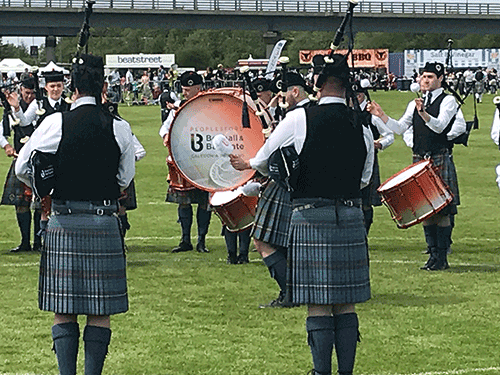
Inveraray, the current World Champions, seemed so laid back as to be near horizontal. This was ‘park the bus’ pipe band playing, if I can use a football analogy. Crisp hands all round, good sound established now don’t do anything silly and we’ll see out that 1 – 0 advantage. It wasn’t enough, and had P/M Liddell gone for it more he could have taken a trick. Oh and one other thing – She Moved Through the Fair was much too drawn out for my taste.
I didn’t like the opening tune from Shotts but they redeemed themselves in the strathspeys and reels. Unlike I’ray they really went for it. This was clean playing with a minimum of harmony. How refreshing. To me the two pillars of a good medley are an impactful start and climactic finish. Unfortunately Shotts endpiece was anti-climactic and left me on the low end of high. Not what you want.

St Laurence O’Toole had an off day and personally I thought them rather fortunate to get fourth in the judges’ list. The drums lacked snare sound (v metallic) and the piping was okay – just okay. SLoT can be slow starters and will up their game as the season progresses and that Worlds Week concert approaches. They have all the talent and the tone.
The warm, dry weather took its toll on the PSNI‘s sound with the high As shrill and the sound weakening as they worked through their set. P/M Cupples drove them on at good tempi throughout however. I think the harmony in the slow air needs another look, ditto the unison in the Foxhunter.
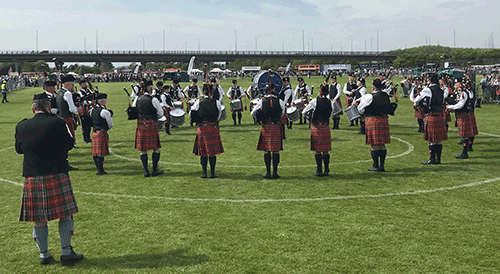
If Boghall showed a marked improvement on 2017 so did Glasgow Police. The only downsides in this performance were a bad ending and over extended phrases in Mingulay Boat Song. Otherwise it was great to see and hear ‘the Polis’ playing with such confidence and verve. Quality fingers too, well demonstrated in their handling of their strathspeys. Keep this up and they’ll make the list at some point at a major.
G1 novitiates Lomond & Clyde just didn’t have the sound required for this level. Indeed I don’t think their sound at Paisley was as good as it was last year in Grade 2. Perhaps they played too long beforehand or the sun got to the pipes and dried them out. A better sound and they will make a better impression.
Sparkling stuff from Fife Police though I thought the high As and Fs were shading off here and there as their medley progressed. P/M Murray demanded the best from his pipers and he got it. The finger was exemplary even when he pushed the tempi right to where they should be in Grade 1 – on the edge. Well worthy of their top six placing.
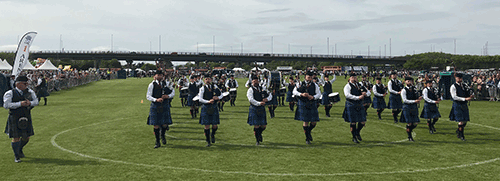
Johnstone are becoming more and more established in this grade. They play and sound like they are part of the G1 furniture. On this occasion their tone just did not sustain and it was hard to concentrate on their accomplished technique and expression when the drones and chanters began drifting apart. Given a couple of more years hard work and experience, this band will make the list, I’m sure.
On came Scottish Power with a fine sound and one of our most beautiful marching airs, Dream Valley of Glendaruel by P/M John MacLellan, Dunoon. Whether it is appropriate as an opening for a competition medley is another matter and diving into overwhelming harmonies on the repeat of the first part belied a lack of confidence in tune selection. The bass drummer boomed at times and I didn’t at all like the cannibalisation of the Lament for Mary MacLeod in the middle of this set. It is close on sacrilege; beneath the dignity of one of our great ceol mor masterpieces to carve it around in this fashion. The strathspeys and reels were probably among the best of the day however – brilliant technique and consistent phrasing. The ending with the reprise of Mary MacLeod left me cold, no, frozen.
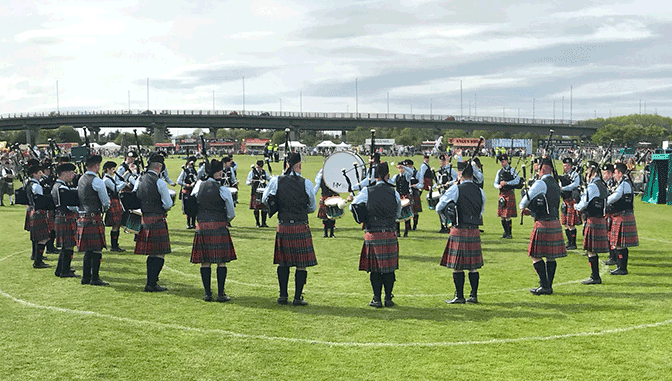
The final band Field Marshal had, by some distance, the best sound in the competition: clear, sweet, superbly balanced. It provided the perfect platform from which they could project their finger perfect fingerwork and immaculate unison. The Hard Drive to finish was a brilliant demonstration of just that, and when allied to swinging off beats and innovative melodic interweaving, provided a thrilling end to their set.
In summary: To my ear Field Marshal Montgomery had the best tone, the best technique and a delivered a near faultless performance on the day. In second there could have been any one of three bands: Inveraray, Scottish Power (main picture) or Boghall with my preference probably favouring the Lothians. What an improvement in this band on last year!
The actual result:
1 Power 2 Inveraray 3 FM 4 SLoT 5 Boghall 6 Fife Police
Now I have no wish to take the shine off Scottish Power’s victory even if my trade requires that I tell it as I hear it and my conclusions differ from those of the judges. So let me offer all congratulations to the band’s pipers and drummers and in particular to L/D Jake Jørgensen who my percussion experts tell me has added a lot of colour and nuance to the SP corps. P/M Armstrong has been at the helm of this band for more than ten years and is due every bit of silverware that comes his way. If he edged it at Paisley there will have been plenty of days when he lost out undeservedly.
• Agree or disagree? Let’s have your comments below. Listen to the winning performances on the RSPBA’s dedicated YouTube Channel here. Check out the summary sheets here.
[wds id=”2″]







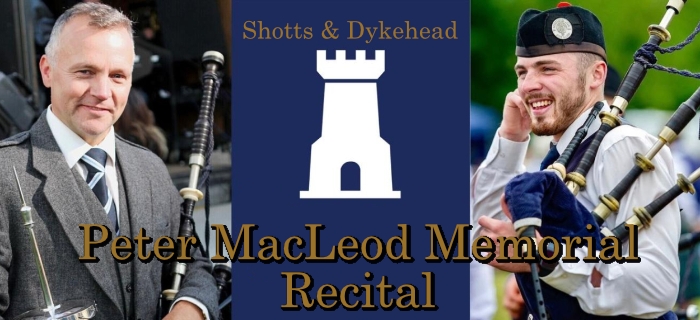








Have to agree with Mr Wallace that Field Marshall were well ahead and should’ve won the contest.
The issue here is the standard of judging and the discrepancies. Not only In grade 1 but throughout the whole contest.
These individuals are actually financially rewarded for the JOB they do at all competitions and as such should surely be subject to scrutiny as to whether they are fit and competent.
So should judges be graded?
There’s no regulations for these so called experts…they do what they want.
Am looking forward to seeing SFU at the big show this summer. I’m hearing that their sound and tempos are great!
Hi Rab,
Firstly well done to Chris and Jake for their success at Paisley and I’m sure any of the other top bands who felt hard done by when they saw the summaries will soon bounce back and be over it by Belfast.
Lets face it, the vast majority of bands who compete week in, week out, year after year, go home on a Saturday feeling that way. It’s only when we win we believe the judges have got things right.
On the topic of the Lament for Mary MacLeod, personally I liked it and I think it worked well. I can’t agree that it’s inclusion would do any harm to ceol mor in gereral. I don’t claim to understand, or to have absorbed this genre any more than than I have jazz, rock or opera for example, but like everyone else out there, when I listen to a piece of music I know whether I like it or not.
I don’t see why you have to be some sort of expert in a certain field to know whether you like it or not. I know nothing of about art, but show me a painting and I will tell you whether I would hang it on my wall or not. I don’t have to be able to paint it myself to appreciate it and I certainly don’t have to go to art school to be told why I should like Pablo Picasso as much as I like John Constable.
So getting back to my point I think Scottish Power are to be applauded for there medley selection and I’m sure to won’t lead to the demise of the Northern Meeting, it may even encourage some to explore ceol mor further and enjoy listening to the whole tune.
Several times now I’ve noticed the Ensemble placing has been abit strange. Several bands positions I though were incorrect most notably FMM but at the end of the day it’s a person’s opinion. But I personally think this should be kept an eye on because it seems like a bit of deja vu for some of the bands sores and as someone else said it wouldn’t matter how far away certain judges where from the bands the placings would be the same.
I think Mr Wallace was not far off the mark. However a particular choice of tune is simply a matter of personal preference and bears no impact on overal performance. I thought the Power’s “ slow air” was a master stroke in addition to their intro. Lovely music. Tempo’s are creeping up year on year and what better way to showcase sound than a lovely 3/4 or 4/4 at the intro?
For me the biggest surprise on the day was the Glasgow Polis. Night and day to last year. They are heading back to where they should be on merit but it’s tough up there in the top six.
Judging is always going to attract criticism but I put my trust in the Adjudicators Panel in selecting judges. It’s never going to be perfect. We are lucky to have people like Mathieson, McLellan, Wilson and Co. Separating bands in the top six is not a science but a matter of opinion. The Ensemble judge is critical to assessing performance as it is the band that is being judged first and foremost and NOT the individual components within the band. But again just my view.
Here’s to a great season!!!
So the individual components surely are as important as ensemble.
What is ensemble? And how is it judged?
Robert,
Controversial results similar to Saturday has went on for many a year and will continue for years to come. The usual discussion being opinion, interpretation, dodgy judging and the like.
There is some brilliant bands in grade 1 and in my humble opinion FM for piping are hard to beat. It’s hard to imagine how you better that medley performance on Saturday? When i saw one judge had them 4th for piping one of my old tutors milder phrases came to mind ‘is his ears painted on?’
There has to have been a bit embarrassment all round on Saturday.
Robert,
I agree with your review of Grade 1, Paisley. I wouldn’t usually express my opinions publicly but I was very disappointed with the overall results.
To me, the summary sheets show very poor assessments by Piping Judge 2 and the Ensemble judge. The Field Marshal were out on their own, in piping terms at least, but it was also delightful to hear Scottish Power going so well and I congratulate them.
I know the only opinions that count are those of the judges, but poor performing judges won’t be respected by people like me.
‘So what?’ they may say, but I’d like to know are judges performances reviewed by the RSPBA? I also feel that the ensemble judge should not have as much influence on the overall outcome as the piping and drumming judges.
I will still go and enjoy all band performances but pay little heed to the results. I suppose I could have said this forty years ago so not much has changed. I believe that high quality judging matters as much as high quality band performances.
I probably shouldn’t say this, and it’s truly sad, but in my opinion if the ensemble judges umpires chair was placed on the hard shoulder of the M8, I doubt if we would have seen a different outcome.
Bob Semple.
Robert, I totally agree that it was unwise for the RSPBA to put 3 newbies on judging duty for the premier grade at Paisley. They have a big enough judging roster to avoid this happening. Indeed, why not spread the newbies across the different grades, rather than put them all in Grade 1. So much is at stake in Grade 1: reputation, prestige, sponsorship, prize money, points towards Champion of Champions.
I congratulate Scottish Power on their excellent result. They have been delivering super performances for years, narrowly missing out on some big wins. So well done Scottish Power and P/M Armstrong.
The standard across the top bands in Grade 1 is so high and consistent, that results are often based on personal preferences of the judges (P/M Iain MacLeod was one of the first to articulate this view over 40 years ago). With 4 judges (2 piping, 1 drumming and 1 ensemble), the final result can just be an average of 4 different personal opinions, with the outcome that sometimes a great performance can go unrewarded, and a safe steady performance across all disciplines can sometimes break through the pack.
Ian Forbes
I think the judges were all experienced in other grades Ian but this was their first time doing a Grade 1 major. Thanks for commenting. RW
Very interesting review as always, Robert – and spiced up with the replies you printed. I will offer a view with ambitious reach (what’s a heaven for, such be my puny grasp?) that attempts to dance around what I perceive to be major issues of judging here. Disclosure – I was a career long high school math(s) teacher in Ontario who returned to adult piping and Bands just as the trend-setting GM Pipe Band was wrapping up and carrying momentum into the newly forged might 78ths Frasers of Whitby. I appreciated your complementary addendum to Bill’s Book launch last August, when you encouraged the likes of John Wilson (standing nearby to your sartorially elegant white suit in that hotly, stifling room packed with so many of our luminaries) to also summarize their careers and insights that improves all our understanding of the game. I want to inform readers that legendary Bill Livingstone’s parting statement was to not let the artistic elements of our music form wither in pursuit of the prize. From what little I have heard from dronechorus’ just released youtubes etc + live listening to the early part of the contest on Saturday, I believe Chris Armstrong most ambitiously attempts to take the tunes of his heid etc and package them in a modern and artfully tasteful package delivered in a meaningful way. It may not be to everyone’s taste, but to think it should be demerited for that seems somewhat backward in a modern era where pipe bands should endeavour to envelop some of the many increasing musical influences available in an interconnected world – a bonus of which allows we “Monday morning quarterbacks” to post mortem and offer a better judgement on a contest recently past. Heh.
Decades ago I asked teachers in my large mathematics department – some 13-14 teachers to take my photocopy of anonymous student exam questions and mark them in their own fashion, so we could discuss and compare our findings. I found the process “semi-epiphanous” and revelational of the very human mechanics that come into such judgements. Mathematics (not cut/dried arithmetic) allows of such latitude as global assessment approaches on top of specifics of mathematical technique and most importantly, articulation and communication (good form etc). Surprisingly difficult to consistently adjudicate as well as balance the various merits of those elements. I will also say that IQ tests attempt to measure some unknown and highly dynamic essence, all poorly articulated and spelled out for what it is, and then supposedly measure this unseen essence as viewed through a smoky glass most darkly. Art forms like pipe band contests have even greater dimensions of complexity. I assume the RSPBA and other ruling pipe band bodies have similar exercises to get feedback on what is being sought, and pointers for its actual measurement. Simple-mindedly one could “go after” top pipe corps on the basis of poorly blown long B’s, D’s and F’s + G’s when they present themselves – assuming these Bands at the top can achieve sustained tuneful A’s balancing in several octaves with the droning sonority that so hallmarks pipes. Other such criteria would be to ding them on ubiquitous flat blowing on harmonies, poor doubling articulation coming through at Band level plus expression concerns. A former generation waxed on about question and answer phrasing being paramount, but I think Duke Ellington said – if it sounds good then it IS good, the very essence of art. If we like it, then it is indeed good, the whole point of art, a medium of emotional communication. Western Highland musical influences have met with varying levels of acceptance/resistance in the likes of Glasgow’s piping enclave over decades that even exceed our long post-WW2 experience. Clearly tastes differ by geographic region and so many other Cultural influences. Such parsing and resulting employment of obdurate guidelines to spell out the individual criteria of performance would end up like Oscar Wilde’s commentary on cynics – they know the price of everything, but the value of nothing. Chris has responded before to your views of medley construction and could quite capably do so again, but I do not mean to entrench individual tastes by merely criticizing. I am hoping for a broader, more tolerant look at what the art form is, so we can pretend to judge its merits. There may be no accounting for taste but we perhaps can reflect on how well packaged and articulated such art appears to be. I believe part of what Bill was saying is that Judges have repeatedly discouraged creative extension of our relatively new idiom (verging on 50 years of medley contests) and you have alluded to such in your criticism of the decreasing palette of wonderful MSR tunes out there that are now offered in top flite Grade 1 contests. A spectator and younger players’ opinion poll would probably bin the MSRs at the cost of leaving a huge pedestal of our art form in the dust. I think hugely way over-submitted tunes like Pretty Marion, Charlie’s Welcome, John McKechnie’s Big Reel (huge and beautiful classics, many would agree) should be banned for 3 years at least, say, for display in Grade 1. An added bonus would require these top Bands to relearn some new MSR tunes and bring fresh passion to them, as they now play the same “big MSR tunes” for decades because of pursuing the prize, the trend Bill so expressly warned of. Conservative Judges make sheet comments re marches like Edinburgh Police, Clan MacColl, Colin Thomson, Kantara to El Arish, etc etc which have resultingly disappeared from the “Big Folks’ ” repertoires this past quarter century. Darwin would say the culling of that herd of tunes was a winnowing process – and I add the Judges have been the tail that wagged the dog here in terms of the artistic exhibition of creative music. Sadly – with statements like such itty bitty 4 part tunes are not suitable for the big Grade 1 Band MSRs – really??
Your comment notably struck me on different Band effect and projection, depending on the listener’s position. If that is true (and clearly it partly is) then what is a Band attempting to project if their audience is scattered 360 style? Nick Hudson and others have repeatedly proffered Concert type formation with open pipe corps at the front and the forever slighted drummers at the back. And would judges always be placed in front of the conductors’ spot? What does that do for the audience down the wings? Our Bands are loud = dBs being a square root of the number of players incidentally – to simplify, which high school teaches is a whale’s back graph quite flattish at the top – over 20 pipers? So I believe we must accept that the whole audience (subject to a loudness diminishing with square of the distance, essentially) does get a flavour of the whole Band’s package – whatever “package” manifests as ultimately being thru our mortal, smoky glass lens.
No easy answers are likely to manifest soon, albeit perhaps many have agreed that a variety of positions for the individual Judge during the contest will optimize the feel for that package. Merely counting dropped grace notes, note errors in one portion of the Band, and cut-outs, squeals + whatever, does little (in my mind) to add to a global understanding of the art package these wonderfully voiced mega Bands now convey. On this day I will not even begin to speak of the pipers’ slow adoption of what Bands and large midsections are conveying. I will mention the Brown boys (Glenn, Blair and Graham), whose own articulation and increasing mastery of the idioms have notably added to my education and understanding of the art form. They joined Shotts originally circa 2002 after “graduating” from Bill’s Frasers Band and spoke of the master “partners in time”, namely Rab M and Jim K who they had known from the dawn of childhood. Even in that era, pipers spoke of FM’s magnificent pipe corps and maligned Shotts’ winning achievements. The Browns convinced me it is a pipe BAND and not merely pipers’ ensembles. A champion of drummers (through the murky? screen of piping chauvinism) like J. Reid Maxwell would presumably prefer the appellation of Pipe AND Drum Bands. In any case, dropping ensemble marks would be missing the mark today, and clearly Robert M is precisely the type of person to understand subtle intricacies and musical aspects unavailable to we less savvied Monday morn quarterbacks. Whether people agree with him is a different matter, but he has a tremendous amount of insights to share. I admire him as an artist in several other fields also – and such talents like his, Richard’s, Bill’s, Chris’, Jake’s etc etc should all be seen in the big scheme of things as adding to our idiom (as you hinted last August). I hope we don’t lose sight in our differences, of the shared passion for a marvellous musical form and whatever genres it allows.
– yours in pipe bands, aye – robin lawson from Vancouver Island